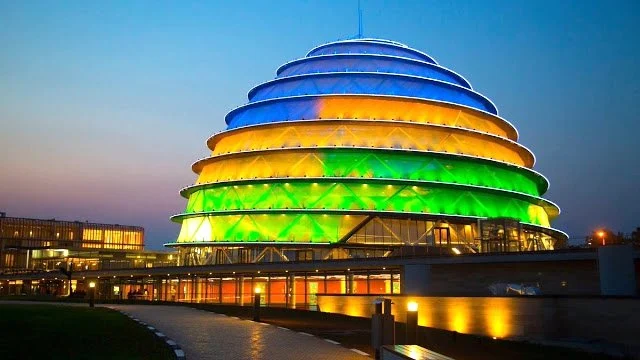Rwanda Dangles Fat Bait – Offers to Host UN Agencies

Rwanda has offered to host key United Nations offices, agencies, and programs currently under review for relocation as part of the UN80 reform agenda.
In a bold pitch to cement its place as a global diplomatic hub, Prime Minister Edouard Ngirente pledges Kigali’s full logistical, institutional, and political support to become a new centre for UN operations.
“As the United Nations undertakes a bold transformation through the UN80 Initiative, Rwanda stands ready to serve as a committed partner,”Ngirente said in a May 15 letter to told UN Secretary-General António Guterres.
He expressed the Kigali government’s intention to support the development of a long-term UN campus in Kigali and offer the full package of privileges, immunities, and tax exemptions in line with UN standards.
Kigali’s proposal underlines Rwanda’s strategic location, direct air connectivity, and institutional efficiency.
It also aligns with the country’s broader strategy to become a premier host for international diplomacy and conferences, having already established itself as a leading MICE (Meetings, Incentives, Conferences, and Exhibitions) destination in Africa.
Over the past decade, the country has rapidly gained ground in the MICE (Meetings, Incentives, Conferences, and Exhibitions) sector, attracting high-level global summits including the Commonwealth Heads of Government Meeting (CHOGM) in 2022 and the Africa CEO Forum.
According to the Rwanda Convention Bureau, the country hosted over 160 international events in 2024 alone, cementing its reputation as one of Africa’s most efficient and secure destinations for global convenings.
“Kigali provides direct air connectivity to key regional and global hubs. Our strong record of political stability, institutional efficiency, and safety ensures continuity of mission and staff well-being,” the letter emphasized.
Rwanda’s advanced infrastructure, seamless visa regime, robust internet connectivity, and top-tier hospitality industry are central to its competitive edge.
These attributes, Ngirente argued, make Rwanda a “cost-effective, secure, reliable and enabling environment” for multilateral operations.
“Our proposal includes the full package of privileges, immunities, and tax exemptions in accordance with UN standards,” Ngirente assured.
In addition to existing modern facilities, the government is proposing to jointly develop a dedicated UN campus—customized to the organization's long-term operational and security needs.
“The Government of Rwanda is prepared to offer office facilities and essential services, while actively partnering on the development of a long-term UN campus in the heart of the City of Kigali,” Ngirente wrote.
The Prime Minister invited the UN to dispatch a technical mission to Kigali to conduct an on-ground assessment of Rwanda’s infrastructure and proposal.
“The visit would allow for a first-hand review of Rwanda’s infrastructure and offers, and align our support with the UN’s operational and relocation requirements,” the letter said.
However, Rwanda’s growing global profile has also attracted scrutiny over its domestic human rights record.
While the country is praised for its economic reforms, security, and governance efficiency, international human rights organizations have repeatedly raised concerns over restrictions on political opposition, media freedom, and civil society space.
Allegations of extrajudicial detentions, surveillance, and limits on freedom of expression have featured in reports by Human Rights Watch, Amnesty International, and the UN itself.
This context presents a delicate balance for the UN, which must weigh Rwanda’s operational strengths and strategic location against its obligations to uphold human rights principles within host countries.
Hosting sensitive UN agencies—especially those dealing with refugees, justice, and humanitarian assistance—would likely attract heightened attention to Rwanda’s internal governance practices.
Still, the government remains confident in its bid. Prime Minister Ngirente assured the UN that Rwanda is fully aligned with the values of the organization and is committed to facilitating their work without interference.
“Rwanda has positioned itself as a competitive destination for multilateral institutions,” he said, inviting a technical mission from the UN to assess the country’s infrastructure and readiness.
This overture represents more than just infrastructure diplomacy—it signals Rwanda’s ambition to deepen its role in global governance. The country has earned international recognition for its peacekeeping contributions, sustainability initiatives, and rapid development trajectory.
Should the UN accept Rwanda’s bid, it would mark one of the most significant diplomatic wins for the country since hosting the UNDP Africa Regional Service Centre and the SDG Centre for Africa.
“We are not just offering buildings—we are offering a partnership grounded in shared values of efficiency, accountability, and global progress,” a senior official in the Prime Minister’s Office told the Nile Post, speaking on background.
Should the bid succeed, Rwanda would join a select group of countries hosting major UN operations, marking a significant shift in Africa’s role in shaping global multilateralism—and potentially putting the spotlight even more firmly on Kigali’s governance track record.



0 Comments